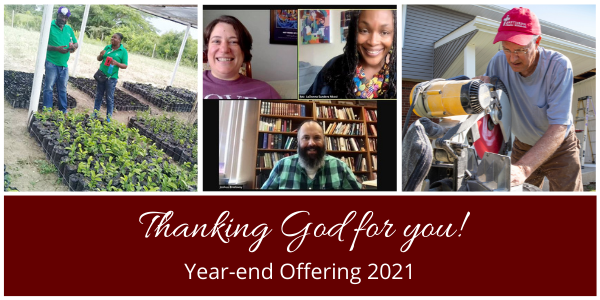
By Traci Rabenstein, director of Mission Advancement
“How can we thank God enough for you in return for all the joy we have in the presence of our God because of you? . . . May the Lord make your love increase and overflow for each other and for everyone else, just as ours does for you.” ~1 Thessalonians 3:9 & 12, NIV
As I write this final reflection for 2021, it’s hard to believe that the year is almost over. My grandparents used to talk about how fast time was moving along. As a young girl, I didn’t really understand. Now I do. Each year seems to go by more quickly than the last, and near the end of each one, I find myself wondering: what impact is the Church of the Brethren making in this world and in our communities?
It is easy to get caught up in the drama and chaos of our country, to move to one side or the other of a discussion or political view, or to use that view as the lens in which we mold God into the image we prefer. We are called, however, to discern with scripture and the Holy Spirit what the shape of God actually is.
In his speech to the Greeks in the Areopagus, Paul told them that we cannot think of God as an object that we can shape. He said, “Therefore, since we are the offspring of God, we ought not to think that the divine nature is like gold or silver or stone, something shaped by art and man’s devising” (Acts 17:29). Instead, we are called to increasingly embody the image of God through our transformative relationship with Jesus Christ and through him seek to love one another as he loved us.
The words of Paul to the church in Thessalonica contain encouragement and blessing for them. 1 Thessalonians 3:11-13 was also written as a prayer for them. His words are a reminder to those who followed the teachings of Christ to be centered, not on themselves or their struggles, but on loving each other and showing compassion to all who were suffering. Indeed, by encouraging them to love generously, he was inviting them to “live and share the radical transformation and holistic peace of Jesus Christ”—a mission that we now carry together.
Through loving one another, we join together to show compassion to those who are in need and with whom we can serve and share God’s blessings. Your support this year allowed for the Global Food Initiative and Brethren Disaster Ministries to send grant monies across the globe to our partners who were in need of assistance during this pandemic season. Your contributions made a way for National Older Adult Conference to gather online and for our Intercultural Ministries to offer webinars to stretch us to think outside ourselves and toward survivors of all kinds of injustice. Your partnership has made it possible for Brethren Volunteer Service and FaithX to provide opportunities for service and workcamps in areas where support was needed. In all these ways and many more, the ministries of the Church of the Brethren have made a difference in 2021 with your help.
As this year ends and the next one begins, we thank God for you and celebrate all that we do together. Thank you for your generous gifts of finances, prayer, and service. Together our love increases and overflows for the glory of God and our neighbor’s good.
Learn more about the ministries of the Church of the Brethren at www.brethren.org/greatthings or give a year-end offering.


